The (Soon To Be) Lost Country of Kiribati
The climate change battle is just getting started. Will an innocent island become the first casualty?
By: Maureen Lu, Staff Writer
They were the first people to see the new millennium. Now the republic of Kiribati, an island nation in the central tropical Pacific Ocean with a population just over 100,000, may also be the first to hit a game over situation when it comes to climate change.
The International Institute for Environment and Development identified Kiribati as one of the top 10 most vulnerable countries in the world to climate change. It consists of one main island called South Tarawa and 32 low-lying atolls. Most of these islands are less than 3 metres above sea level.
“You probably couldn’t find it on most of the world maps,” says Ms. Takotaake (referred to as Tako below), a 27-year-old local council clerk from Kiribati. I first meet her at the Women in Local Government Networking Drink in Hobart, Australia.
“Hobart is very cold for me,” she explains. “In my country, the summer never ends.” It’s May and she’s wearing a simple black jumper, a coat and a pair of feather earrings.
[pullquote]“People who still don’t believe in climate change should come to my country to see how [it has] damaged [us].”[/pullquote]
After a 22 hour flight from Kiribati and a one day study tour, she looks tired but satisfied.
“Our government and our president are trying very hard to let the world know what is happening in Kiribati,” she says, already concerned about the future of her home country. “People who still don’t believe in climate change should come to my country to see how [it has] damaged [us].”
Tako graduated from finance management at the University of the South Pacific, which is based in Suva, Fiji’s capital, and jointly owned by 12 Pacific island countries. “There are no universities at all in Kiribati and only young people from urban area have a chance for higher education abroad,” she says.
Tako’s older sister is studying management as well, but in Taiwan. “She loves life in Taiwan, but she will come back home after [her] two-year master’s program,” she explains, adding that the country and people need their help.
While others her age are focused on starting their adult lives, Tako just wants to save her childhood home. It is no longer just about abstract figures, boring reports or complicated political debates. Real people are losing their farms, houses, childhood playgrounds and chances to have a future.
The memories of an entire a nation are at risk. Elders will no longer be able to see the houses they spend their lifetime building. Young children won’t see the sun rising up from the horizon at the same spots their ancestors did years before them.
Kiribati has had difficulty rebuilding the coastal infrastructure lost to erosion and storm surges. The rising sea levels are a direct result of the coastal erosion. Many of its pancake-flat islands have already been engulfed by the waves, which have also contaminated freshwater supplies, destroyed crops and eroded farms and beaches.
The livelihoods of many islanders depend on the corals reefs and other sea ecosystems, which have been damaged as well. There have also been changes in rainfall patterns, causing droughts in some areas and flooding in others.
Additionally, the nation is also experiencing a high population concentration on the main atoll. With some outer islands having been invaded by the sea, beachside communities have been forced to move.
In South Tarawa, where half of Kiribati’s population lives, the high population density poses huge challenges for the local government concerning food and water, security, health and infrastructure.
The city councils in South Tarawa are also facing lack of space in graveyards, cleanliness issues on the beaches and a gradual loss of freshwater.
The Kiribati government had proposed a man-made floating island, like an offshore oil platform. It would be expensive and a tad surreal, like something out of a post-apocalyptic novel. However, the president says that even the most radical ideas need to be considered.
The government has already launched a negotiation with the Fijian military government to buy land for the relocation of the entire country. President Anote Tong tells Fiji National TV that a local land agent has identified 1500-2000 hectares of freehold land on the island of Vanua Levu.
The president calls for a “relocation with dignity”. To prepare for the possible national repositioning in 50 years, the Kiribati government has launched an Education for Migration Program in order to help their population become more attractive to foreign hosts.
The local councils have also asked other countries for help in training their people in agricultural and nursing. New Zealand’s Recognized Seasonal Employer and Kiribati-Australia Nurses Initiative are the biggest foreign aid programs when it comes to training local people and about 80 Kiribati people received nursing training in Australia.
Kiribati is not on track to meet any of the Millennium Development Goals that all UN members must achieve by 2015. It has a narrow and fragile economic system with very limited sources of income, fully dependent on the world’s demand for their leading export, coconut.
Tourism is also an important part of the local economy, but it is largely constrained by the scarcity of flights. Kiribati is two hours from Hawaii, yet the only air link to the outside world is a Boeing 737 which comes in twice a week from Fiji. “It is only a couple of hours’ flight from Kiribati to Australia,” Tako says. “But we have to stop by Fiji and sometimes Dubai to transfer.”
The country relies largely on foreign assistance. Tako expressed her gratitude for the help they’ve received from Australia, New Zealand and Japan. Australia has been the biggest donor to Kiribati and most of their donation has been used to build seawalls to protect the main road, to help manage the impacts of coastal erosion and rising sea levels and to provide water supply services.
In February 2013, the Foreign Affairs and Trade department of Australia announced a further $2 million donation to help Kiribati in coping with climate variability and change. The money will be used to improve the management of water resources, including village water supplies, through infrastructure upgrades, ground water quality monitoring, and improving sanitation to reduce groundwater pollution.
New Zealand is the only country that has taken in climate refugees. It offers 75 places a year to migrants from the islands and atolls.
Oddly enough, on Kiribati, many people don’t believe in global warming and climate change, especially those who live in the outer islands. Kiribati is a Christian country and 99 per cent of the population believes in God.
The effects of climate change on the everyday life of Kiribati are hard to ignore, but many of them have their own explanation of the disasters. Catholic leaders and priests in Kiribati, who are highly influential, reject the notion that man could be responsible for climate change. They believe climate change is an action from God rather than human activity. They also believe they are losing their island as punishment for human wrongdoing and that they don’t need to do anything because God promised he would never sent a flood to destroy humankind again.
School principal Zita Lopez is one of those people who “does not really” believe in climate change. She says she takes comfort in the Old Testament story of Noah, and God’s promise never to flood the Earth. She shares her view with her students.
“They don’t understand climate change. Even though their island is dying, they still don’t want to do anything or [leave],” Tako says sadly. “They would rather die with the island.”
Kiribati has done nothing to earn this fate. With a small population and barely any industries in the country, its greenhouse gas emissions are negligible. However, these humble and friendly people will be forced to give up their land. They look desperately to the rich countries for help, those who have contributed the most to the greenhouse game.
As a small country, Kiribati has shouldered great responsibility in preserving the environment. In 2008, the government declared 150,000 square miles of Phoenix Islands as protected Marine Park. Any methods of exploiting natural resources, including fishing, are limited. The Phoenix Islands Protected Area, at 408,205 square kilometers, is now a United Nations World Heritage Site.
[pullquote]“They don’t understand climate change. Even though their island is dying, they still don’t want to do anything or [leave]… They would rather die with the island.”[/pullquote]
“We need to make sacrifices to provide a future for our children and grandchildren,” the Kiribati president says.
In World War II, Kiribati was a battle field for troops from Japan and America and their people suffered greatly. Now it again becomes the frontline of a war it has no part in. As a country on the frontline of climate change, they are going to be one of the first affected by the lack of action by others.
Maureen Lu is a Chinese-background junior journalist based in Australia. She is currently working towards a Master of Global Media Communications at the University of Melbourne. Her passions include environmental problems, international issues and gender equity.
Source
BBC, “Kiribati profile”
U.S Department of State, International Religious Freedom Report 2007
Rhett A. Butler, As a tiny island nation makes a big sacrifice, will the rest of the world follow suit?
Kathy Marks, Sinking Pacific Island Kiribati considers moving to a man-made alternative
Paul Chapman, Entire nation of Kiribati to be relocated over rising sea level threat
Bernard Lagan, A Nation Going Under
Justin T Locke, Climate change-induced migration in the Pacific Region: sudden crisis and long-term developments, The Geographical Journal vol 176, No.3, 2009
Mathias Risse, The Right to Relocation: Disappearing Island Nations and Common Ownership of the Earth. Carnegie Council for Ethics in International Affairs, 2009
Donovan Storey & Shawn Hunter, Kiribati: an environmental ‘perfect storm’. Australia Geographer, Vol. 41, No.2, June 2010
Image courtesy of KevGuy4101 via Flickr
Image courtesy of Free Grunge Textures via Flickr


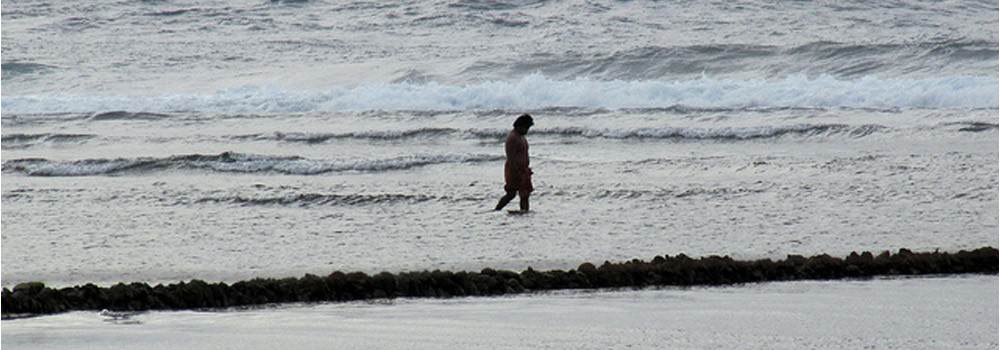










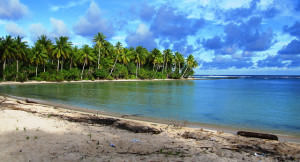
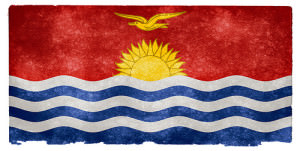
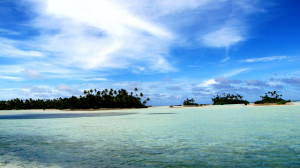
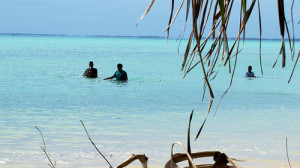


















Share the post "The (Soon To Be) Lost Country of Kiribati"